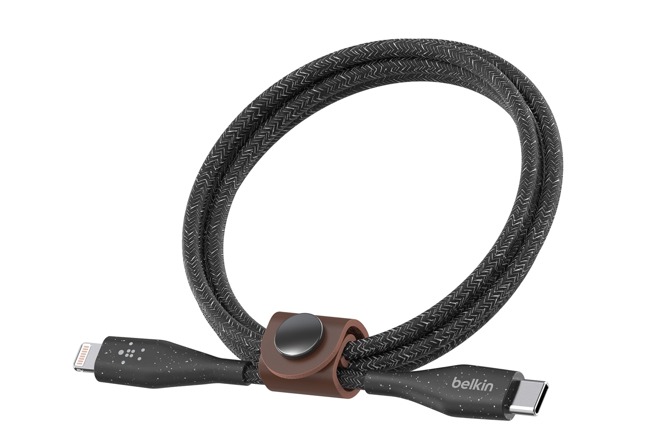First third-party USB-C to Lightning cable is the Belkin BoostCharge
Belkin has introduced a collection of BoostCharge cables for connecting devices requiring power to chargers and power banks, with the series featuring the first third-party USB-C to Lightning cable that has been approved by Apple.

Belkin BoostCharge USB-C to Lightning charging cable
The BoostCharge USB-C to Lightning cables, arriving along with more conventional variants for USB-A to USB-C and USB-A to Lightning, is a notable release as the first of its kind. Previously, the only official USB-C to Lightning cable was produced by Apple, which did not previously allow any third-party accessory vendors to create their own, a stance that the iPhone maker has since changed.
Apple started warning manufacturers about the change in September, before offering specific Lightning connector components up for preorder in December. Belkin is the first to have taken advantage of the components, but is likely to be followed by other firms keen to capture a piece of a relatively one-sided market.
The BoostCharge cables are offered in 4-foot, 6-foot, and 10-foot lengths, and are designed for maximum durability and strength using a material called DuraTek. Accompanying each of the speckled cables is a leather strap, to help keep cables looped and prevent tangling while stowed away.
Arriving this Spring, the cables will start from $24.99 rising to $34.99, depending on length.
AppleInsider will be attending the Las Vegas Consumer Electronics Show starting on January 8 through January 11 where we're expecting 5G devices, HomeKit, 8K monitors and more. Keep up with our coverage by downloading the AppleInsider app, and follow us on YouTube, Twitter @appleinsider and Facebook for live, late-breaking coverage. You can also check out our official Instagram account for exclusive photos throughout the event.

Belkin BoostCharge USB-C to Lightning charging cable
The BoostCharge USB-C to Lightning cables, arriving along with more conventional variants for USB-A to USB-C and USB-A to Lightning, is a notable release as the first of its kind. Previously, the only official USB-C to Lightning cable was produced by Apple, which did not previously allow any third-party accessory vendors to create their own, a stance that the iPhone maker has since changed.
Apple started warning manufacturers about the change in September, before offering specific Lightning connector components up for preorder in December. Belkin is the first to have taken advantage of the components, but is likely to be followed by other firms keen to capture a piece of a relatively one-sided market.
The BoostCharge cables are offered in 4-foot, 6-foot, and 10-foot lengths, and are designed for maximum durability and strength using a material called DuraTek. Accompanying each of the speckled cables is a leather strap, to help keep cables looped and prevent tangling while stowed away.
Arriving this Spring, the cables will start from $24.99 rising to $34.99, depending on length.
AppleInsider will be attending the Las Vegas Consumer Electronics Show starting on January 8 through January 11 where we're expecting 5G devices, HomeKit, 8K monitors and more. Keep up with our coverage by downloading the AppleInsider app, and follow us on YouTube, Twitter @appleinsider and Facebook for live, late-breaking coverage. You can also check out our official Instagram account for exclusive photos throughout the event.

Comments
since virtually everyone has a usb c-a dongle for their MacBook, of what practical use are these?
It’s not that I can’t imagine a use for the cable, it’s that when I consider the real world scenarios, the actual usefulness largely disappears. I freely admit that this may change in the future, but for now I stand by my original opinion - for the majority of people, this is simply replacing a multi-use dongle with a single use one.
Edit - if Apple would switch iPhones to USB C instead of lightning, then you could use a strainght USB C-C cable
Even if you don't use random USB ports, USB C chargers are still difficult to find and there is little benefit to USB C. You can pay $50 for a 30W USB charger (plus another $20 for the cable) but it only takes 20 minutes off the charging time, so there's little practical benefit beyond the 12W charger that comes with iPads or cay be bought for $20.
I know some people are making the effort to move away from USB A, and that's fine. If they want to spend a bunch of money on extra cables, charging bricks, etc, good for them. My point is that there is little practical benefit to doing so in the majority of cases and I find it interesting that people are willing to put significant effort and money to move to USB C when there is so little actual benefit.